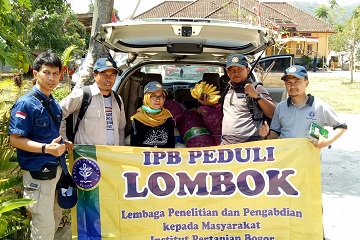IPB Conducts Agricultural Data Collection in North Lombok Regency Affected by Disasters

The Swift Response Team of the Bogor Agricultural Institute (IPB) Disaster Study Center for Research and Community Services (LPPM) together with a team from IPB's LPPM coordinated with the Agriculture and Food Security Service of North Lombok Regency (KLU) to collect data on livestock and agriculture conditions after the earthquake disaster.
The Coordination was led by the Head of the Livestock Division of North Lombok Regency Raden Ardhi and was attended by the Head of the District Agriculture and Plant Office. This meeting aims to collect data on damage and losses due to the earthquake.
The Head of the North Lombok Food and Agriculture Service, Ir. H. Melta, said that the data collection must be carried out immediately. "Soon our farmers will plant rice. We have to prepare a variety of plans so that farmers also do not experience serious problems," he said.
Official of the West Nusa Tenggara (NTB) Center for Assessment of Agricultural Technology (BPTP), Dr. Sasongko said that BPTP NTB was appointed to be the main posts in planning rehabilitation programs. BPTP NTB will coordinate the assistance that will be given by the Ministry of Agriculture (Ministry of Agriculture). "In this case we focus on talking about livestock. The aid that has been distributed is concentrate from sugar cane feed," he said.
From the data that has been collected, there are 20 thousand cows in Bayan District. Most cows are in good condition. But in rural areas, conditions are still not all that can be reached. There are 16 animals lost estimated.
Meanwhile, representatives from the Denpasar Superior Animal Breeding Center (BPTU) said that the Ministry of Agriculture had sent 16 tons of sugarcane shoot concentrate. Eight tons were sent to Northern Lombok Regency and eight tons were sent to East Lombok. "Indeed, in the future it will take time to inventory the needs of farmers," he added.
The Regional Technical Implementation Unit (UPTD) of Bayan said that the UPTD building near Anyar Market was cracked. Agriculture currently cannot grow rice, and drinking needs still depend on river water.
In Kayangan village, up to now four compost houses have been destroyed. Three of the four food granaries also collapsed. The food granaries, which were 90% complete, were completely destroyed.
Livestock that die a lot in Kayangan village are goats. The death was caused by collapsed cage and then hitting the goat. As for the conditions of laying hens, the cage was damaged because of being hit by collapsed wall.
Raden from Kayangan village reported that in Sampet village, the given duckling aid there are only 100 of the 700 now because they were crushed by the falling ceiling. The condition is also lack of food and lack of clean water.
Meanwhile, the condition of Sengen village is experiencing drought because the river water is dry. The community also needs clean water tanks, especially in the Selengin village. In Sesaid village, the feed barns were severely damaged, 15 goats and 6 cows died.
For conditions in Tanjung Subdistrict, the Animal Health Center (Puskeswan) was damaged, the animal market, two cows died and three barns were lightly damaged. The dam in Kroya also suffered a bit of leaking but was not serious.
Meanwhile, the conditions in Pemenang Sub-district, the branch office can still be used for warehouses and prayer rooms. Reported by the community, there were 6 cattle lost in Telaga Wareng, 2 were killed by a wall. Farmers need feed because many of the livestock have left behind by their owner. The condition of some livestock is still being released.
Data from Gangga sub-district, the condition of residents' houses is 98 percent were destroyed. Private livestock and communal cages differ in their conditions. Many individual cattle are evacuated near the population post including goats. Private cows that were declared missing were around 25 and have not been found.
The condition of chicken livestock are also experiencing difficulties in feed and drinking water. Meanwhile in the Selengan village clove pickers were gone. Currently in the picking season but the price is bad. The road conditions are damaged and vulnerable. There are still around 80 tons of clove yet to get out. Prices also dropped from 105 thousand Rupiahs to 85 thousand Rupiahs per kilogram.
"From the available data, the approach will begin with farmer groups and livestock. Communities belonging to groups are prioritized to be recipients of assistance. Then it is only directed to the community which is consolidated in one particular area. For private breeders whose livestock are still lost or lost, introduction will be sought through the network of rural communities," said Dr. Yonvitner, as the Head of the IPB Disaster Study Center.
The team from IPB suggested the importance of paying attention to animal health conditions. Because the critical condition for farmers is after disaster emergency period. (FM)


